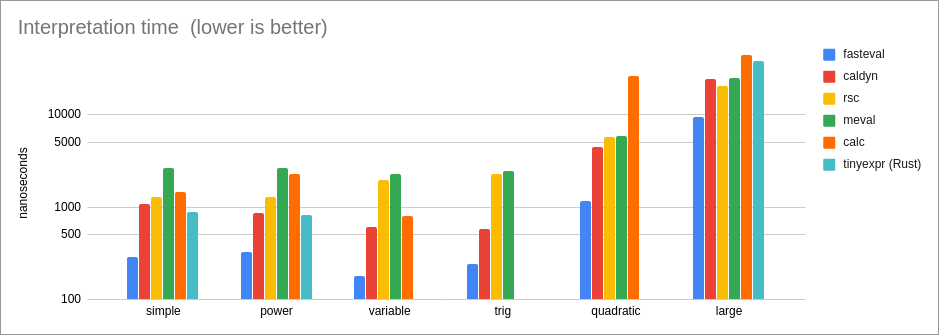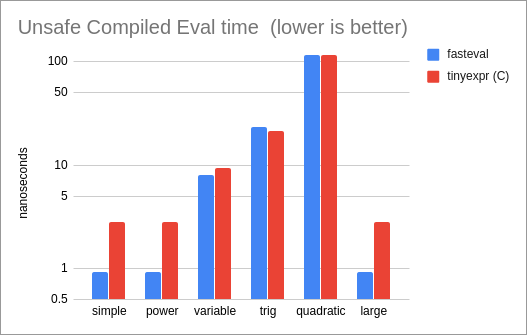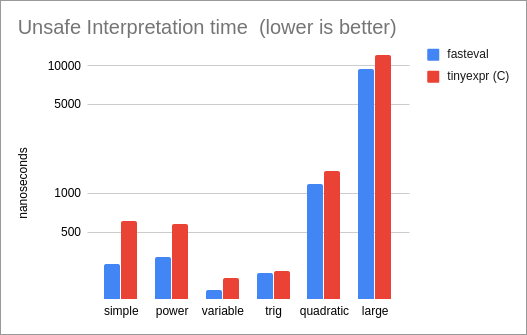# fasteval
Fast evaluation of algebraic expressions
`fasteval` is a library for parsing, compiling, and evaluating algebraic expressions.
It can be used directly as a calculator language (much like `python`), and it is
an excellent foundation for building higher-level-languages.
Documentation:
* [API Reference (docs.rs)](https://docs.rs/fasteval/)
## Usage
Add this to your Cargo.toml:
[dependencies]
fasteval = "0.2.2"
You should **always** build with `RUSTFLAGS="--emit=asm"` because it greatly improves LLVM's compile-time optimizations.
If you are using a 'nightly' Rust compiler, you can build with `--features nightly` to enable optimizations that aren't yet available in Rust 'stable'.
You can build with `--no-default-features` to disable alphabetical keywords like `and`, `or`, `NaN`, `inf`. (These words might be important to your applications.)
You can build with `--features unsafe-vars` to enable [Unsafe Variables](https://docs.rs/fasteval/#unsafe-variables).
## Features
* Safe execution of untrusted expressions.
* Works with stable Rust.
* Supports interpretation (i.e. parse & eval) as well as compiled execution (i.e. parse, compile, eval).
* Supports Variables and Custom Functions.
* `fasteval` is a good base for building higher-level languages.
* Supports many built-in functions and constants.
* Supports all the standard algebraic unary and binary operators (+ - * / ^ %),
as well as comparisons (< <= == != >= >) and logical operators (&& ||) with
short-circuit support.
* Easy integration into many different types of applications, including scoped evaluation.
* Very fast performance.
## Easy Example
Here is one simple example. See the [API Reference](https://docs.rs/fasteval/#examples) for many more!
The `ez_eval()` function performs the entire allocation-parse-eval process
for you. It is slightly inefficient because it always allocates a
fresh `Slab`, but it is very simple to use:
```rust
fn main() -> Result<(), fasteval::Error> {
// This example doesn't use any variables, so just use an EmptyNamespace:
let mut ns = fasteval::EmptyNamespace;
let val = fasteval::ez_eval(
"1+2*3/4^5%6 + log(100K) + log(e(),100) + [3*(3-3)/3] + (2<3) && 1.23", &mut ns)?;
// | | | | | | | |
// | | | | | | | boolean logic with short-circuit support
// | | | | | | comparisons
// | | | | | square-brackets act like parenthesis
// | | | | built-in constants: e(), pi()
// | | | 'log' can take an optional first 'base' argument, defaults to 10
// | | numeric literal with suffix: n, µ, m, K, M, G, T
// | many built-in functions: print, int, ceil, floor, abs, sign, log, round, min, max, sin, asin, ...
// standard binary operators
assert_eq!(val, 1.23);
Ok(())
}
```
## REPL Demo
```text
github.com/likebike/fasteval$ rlwrap cargo run --release --example repl
Finished release [optimized] target(s) in 0.01s
Running `target/release/examples/repl`
>>> print("Hello fasteval", 1, 2, 3)
Hello fasteval 1 2 3
3
>>> _ + 1
4
>>> _ + 1
5
>>> _ * 2
10
>>> _ ^ 0.5
3.1622776601683795
>>> let a = 1
1
>>> let b = a + 1
2
>>> let c = a + b * 3
7
>>> a + b + c
10
>>> push
Entered scope[1]
>>> let b = b + 10
12
>>> a + b + c
20
>>> pop
Exited scope[1]
>>> a + b + c
10
>>> 1+2*3/4^5%6 + log(100K) + log(e(),100) + [3*(3-3)/3] + (2<3) && 1.23
1.23
>>> 1+2*3/4^5%6 + print("log(100K) =",log(100K)) + log(e(),100) + [3*(3-3)/3] + (2<3) && 1.23
log(100K) = 5
1.23
```
## Safety
`fasteval` is designed to evaluate untrusted expressions safely. By
default, an expression can only perform math operations; there is no way
for it to access other types of operations (like network or filesystem or
external commands). Additionally, we guard against malicious expressions:
* Expressions that are too large (greater than 4KB).
* Expressions that are too-deeply nested (greater than 32 levels).
* Expressions with too many values (greater than 64).
* Expressions with too many sub-expressions (greater than 64).
All limits can be customized at parse time. If any limits are exceeded,
[`parse()`](https://docs.rs/fasteval/latest/fasteval/parser/struct.Parser.html#method.parse) will return an
[Error](https://docs.rs/fasteval/latest/fasteval/error/enum.Error.html).
Note that it *is* possible for you (the developer) to define custom functions
which might perform dangerous operations. It is your responsibility to make
sure that all custom functionality is safe.
## Performance Benchmarks
Here is a short summary of the performance benchmarks. For a more complete report and anlysis, see the [API Reference](https://docs.rs/fasteval/#performance-benchmarks).
### Charts
Note that the following charts use logarithmic scales. Therefore, tiny
visual differences actually represent very significant performance
differences.
**Performance of evaluation of a compiled expression:**

**Performance of one-time interpretation (parse and eval):**

**Performance of compiled Unsafe Variables, compared to the tinyexpr C library (the
only other library in our test set that supports this mode):**

**Performance of interpreted Unsafe Variables, compared to the tinyexpr C library (the
only other library in our test set that supports this mode):**

### Summary
The impressive thing about these results is that `fasteval` consistently
achieves the fastest times across every benchmark and in every mode of
operation (interpreted, compiled, and unsafe). It's easy to create a
design to claim the #1 spot in any one of these metrics by sacrificing
performance in another, but it is difficult to create a design that can be
#1 across-the-board.
Because of the broad and robust performance advantages, `fasteval` is very
likely to be an excellent choice for your dynamic evaluation needs.
## License
`fasteval` is distributed under the terms the MIT license.
See [LICENSE](https://github.com/likebike/fasteval/blob/master/LICENSE) for details.